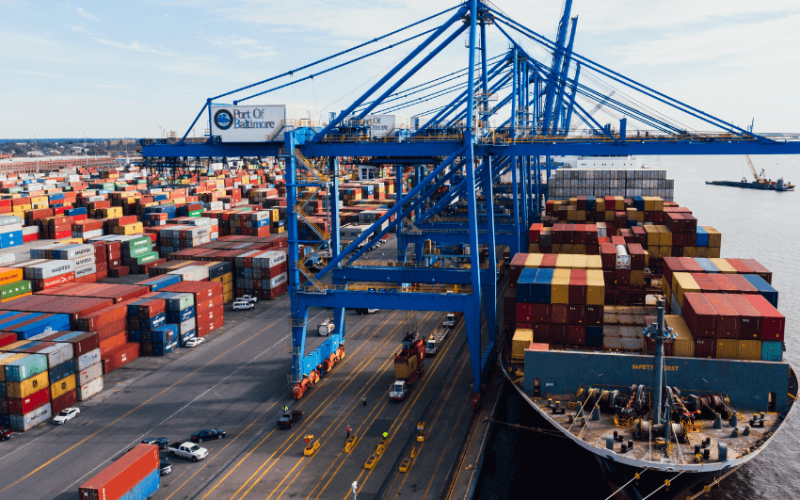What is Freight Forwarding? A Beginner’s Guide

Learn what freight forwarding is, how it works, types, benefits, and why it’s key for global trade success.
Global trade depends on one critical process, which is moving goods safely and efficiently across borders. Freight forwarding steps in here to help you with this. Whether you’re a business importing raw material or a retailer exporting products worldwide, freight forwarders will help you manage the complex logistics of international shipping. In this beginner’s guide, we’ll explain what freight forwarding is, how it works, why it matters for businesses, and what you should know before choosing a freight forwarding partner. What is Freight Forwarding? Freight forwarding is the process of organizing and coordinating the shipment of goods from one place to another, often across countries. A freight forwarder acts as a mediator between businesses and transportation services. Also ensures that cargo moves smoothly either through air or road. Unlike carriers who physcially transport the goods, freight forwarder plan the whole setup. They specialize in planning documentation, customs clearance, and problem-solving. You can assume them as travel agents for cargo, they themselves don’t own ships or planes but they make sure your goods get to their destiny. How freight forwarding works. Freight forwarding is a complex process. The freight forwarding process is usually done in the form of the following steps: Export haulage: your product is shipped out of the manufacturer or the supplier to the warehouse of the freight forwarder. Clearing of export custom: the freight forwarder will check the export regulations and provide the necessary documents. Origin handling: your goods are checked, gathered, and then prepared for the main transport. Main transportation: the actual shipment is then done, whether by air, ocean, or land. Import custom’s clearance: customs documentation is handled in the destination country of your goods. Destination handling: your goods are unloaded, checked and then are prepared for the delivery. Import haulage: final delivery is done to your way. By managing each step, freight forwarders save business time, reduce risks, and ensure compliance with complex international trade rules. Why do businesses use freight forwarding services? Freight forwarding has been a necessity to businesses involved in international trade. Following are some main reasons businesses rely on it: Expertise in custom regulations avoid costly delays and fines. Forwarders do negotiations with carriers to get competitive shipping rates. Risk management is done through insurance, compliance, and contingency planning. Businesses focus on operations while forwarders handle logistics. Access to a worldwide network of shipping and logistics partners. For small businesses entering global trade, freight forwarding makes international shipping possible without any need of in-house logistics expertise. Types of freight forwarding Depending on business needs, there are different modes of transportation that freight forwarding covers. Air freight forwarding: it is fast, reliable, ideal for any urgent or high-volume shipments. Sea freight forwarding: it is cost-effective for bulk goods, slower but suitable for large volumes. Road freight forwarding: it is the type of freight forwarding which is flexible and is commonly used for regional shipments. Rail freight forwarding: very efficient for long-distance overload transport. Multimodal freight forwarding: it can be said as a mix of transport types. It’s for seamless global logistics. What does a freight forwarder do? The duties of a freight forwarder is more than just booking cargo spaces. Their responsibilities often includes: To plan optimal shipping routes To negotiate freight rates with carriers To prepare and check documents To manage customs brokerage and compliance To provide cargo insurances To track shipments and provide real-time updates To solve warehouse and shipping issues To resolve delivery and disruptions problems By handling these complex tasks, forwarders make international logistics seamless for businesses. Key benefits of freight forwarding for businesses For companies who move goods across borders, they can receive following benefits by hiring a freight forwarder: Saves time and resources: there is no need of learning every country’s shipping regulations. This will save time and resources that were to be used in doing so. Reduces costs: freight forwarders save businesses money by negotiating better rates and avoiding unnecessary fees. Minimizes risks: freight forwarders are professionals in handling. This reduces the chance of delays and legal issues. Flexibility: as mentioned above the multiple modes of transport, these modes can be tailored to howerer you need. Challenges in freight forwarding Although freight forwarding simplifies the trade, it doesn’t come without challenges. The challenges may include the global disruptions like pandemics, wars or strikes. These disruptions can retard shipments. The rising costs of fuels can increase the freight rates. The regulatory changes require constant updates. During peak season, there can occur the capacity constraint which limits the options. Experienced forwarders help your business navigate these issues with contingency planning and industry expertise. The selection of the appropriate freight forwarder. In choosing a freight forwarder, you may look up to the following attributes: Knowledge on your industry and your preferred shipping routes. International carrier network and consortium. Hipment real-time tracking customer service. No disguised charges. Good reputation, proven reliability. A good freight forwarder must be considered as a part of your company, which will contribute to your development and success in global markets. Freight forwarder: FAQs. Q1. are freight forwarders ship or plane owners? No. freight forwarers can become intermediaters between carriers but can’t own the transports themselves. Q2. is freight forwarding same as logistics? Not exactly. Logistics cover the entire supply chain while freight frowarding is only concerned with moving goods. Q3. how much do freight forwarding costs? Costs basically depend on shipment size, distance, mode of transport and customs requirements. Q4. can small businesses use freight forwarding? Yes! Many freight forwarders now a days specialize in helping small and medium businesses manage international shipping affordably. Conclusion To sum up, freight forwarding is the bridge between your business and global trade. By managing th complexities of international shipping. These my include documentation, regulations and transportation. Freight forwarders enable your company either of whatever size, to expand into new markets. Whether you’re a small business importing products or a large corporation organizing global supply chains, partnering with right freight forwarder is the key. If you are ready to explore global trade opportunities, consider working with trusted freight forwarder. This will help in simplifying your process and will help your business grow globally.


Write A Comment
No Comments